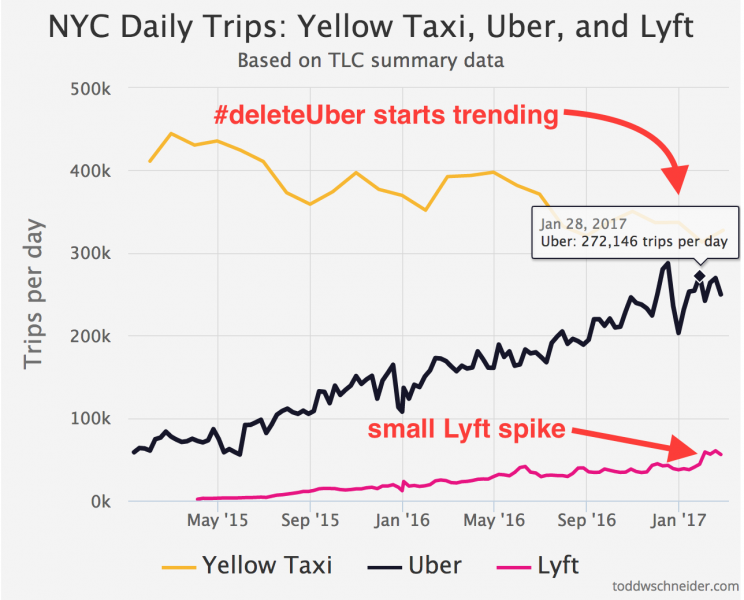Uber boycott didn’t do much damage, initial data shows

Uber has arguably had the roughest year of its 8-year existence, and it’s only April. The company was beset by scandal after scandal, including what some considered tacit support of the White House’s ban on refugees from predominantly Muslim countries, allegations of sexual harassment, questionably legal anti-regulation tactics, and more.
Starting in late January, the #deleteUber hashtag went viral and the company had to create a new part of their app they never thought to build—a way for people to delete their account. (Previously, users had to contact the company.) Over 200,000 people deleted their Uber accounts by the first week of February.
With the viral nature of the anti-Uber sentiment, questions emerged about how much damage the viral campaign would actually do to the company, and what boons there might be for competitors like Lyft.
The New York City Taxi and Limousine Commission (TLC) has released the numbers for February—they run on a two-month delay—finally giving insight into the damage from the scandals in Uber’s biggest market. The TLC report covers number of rides by taxis, limousines, and any other car-for-hire services, which include app-based services like Uber, Lyft, Juno, and Gett.
Without knowing March’s data yet, it’s too early to know the effects of many of the scandals, but the month following the #deleteUber campaign’s beginning is on the books. There doesn’t appear to have been much damage. Uber ridership numbers typically fluctuate, and trips were at a localized peak of around 272,000 per day when the hashtag began to trend on Jan. 28 and became most prevalent over the week following (President Trump issued the administration’s first travel ban on Jan. 27).

About a week later, trips were down 11%. Whether that was because of Uber’s bad reputation or other factors—random drops like this are commonplace due to weather and holidays—is impossible to know. The point, however, becomes somewhat moot when, on Feb. 18, the numbers return to 270,000 rides per day. Uber appears to have been negligibly affected.
With so much noise in the system from demand naturally fluctuating, it’s hard to attribute changes to a cause like #deleteUber). However, the TLC data, pulled and consolidated into a visualization above by data scientist Todd W. Schneider, shows an uptick in Lyft that appears to be statistically significant. On Jan. 28, the day #deleteUber was born, Lyft made 44,000 trips and by Feb. 4, they were at 59,000, a massive 44% jump—during Uber’s 11% decline. (Yellow cabs also experienced a jump during that period.)
Adding more detail is difficult. Lyft could have cannibalized new signups that would have otherwise gone to Uber, or riders could have simply used Lyft slightly more. It’s impossible to say.
The TLC data is not current thanks to the lag period, so there isn’t any data from March to provide further insight into any fallout (for example, from a different allegation against Uber). However, a survey published in late March and conducted by LendEDU, a student loan company, found that 93% of US millennials indicated they wouldn’t stop using Uber despite the controversy surrounding the tech unicorn. The reasons? On the one hand, it works really well. But as one Uber rider told Yahoo Finance in the wake of the scandal, it’s hard to turn down taxi rides subsidized by VC while they last.
Ethan Wolff-Mann is a writer at Yahoo Finance focusing on consumer issues, tech, and personal finance. Follow him on Twitter @ewolffmann. Got a tip? Send it to tips@yahoo-inc.com.
Read more:
Subprime auto loans too small to be a big problem, says Dimon
An interesting market sign says private jet sales may be about to take off
Democrats found a way to speak Trump’s language
What Trump’s intriguing Nafta changes say about his other promises
Facebook’s copy of Snap stories is a reminder of a Silicon Valley hard truth
The trick to getting credit card fees waived? Just ask
These two companies lobby to make your taxes way harder
Chase’s Sapphire Reserve is very worth it, even with its slashed bonus